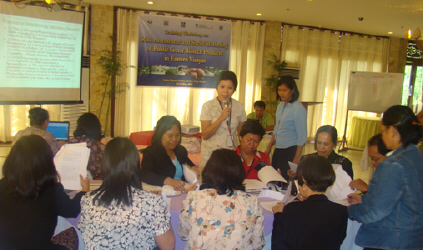
Filipino Scientists Hope to Develop Virus Resistant Sweet Potato
May 15, 2009| |
The Philippines hopes to have a genetically modified sweet potato in the next five years. Scientists from the Visayas State University (VSU) and the University of the Philippines Los Baños Institute of Plant Breeding (UPLB-IPB) are now working on the development of virus resistant sweet potato (VRSP) through Agrobacterium-mediated transformation. Sweet potato is a popular cash crop abundantly planted to more than 120,500 hectares in the Philippines. The most widely spread and important among these, is the sweet potato feathery mottle virus (SPFMV) which is associated with leaf curl, a disease known as "Kamote Kulot" in Luzon, which is reported to reduce yield of sweet potato by 40-60% in Leyte and 85-98% in Albay.
"Currently, we already have our gene of construct for the VRSP, and it is being validated. The transformation and tissue culture components are under optimization and hopefully, we expect to have the field trials of these VRSP sweet potato varieties by 2011," shares Ms. Lolita Dolores, a virologist and project leader from UPLB-IPB. The workshop was organized by the International Service for the Acquisition of Agri-biotech Applications, the Southeast Asian Regional Center for Graduate Study and Research in Agriculture through Biotechnology Information Center (SEARCA-BIC), Philippine Council for Agriculture, Forestry and Natural Resources Research and Development (PCARRD), Program for Biosafety Systems Southeast Asia, and the VSU as part of the capacity building initiatives for the scientists and regulators in the region.

For additional information regarding the VRSP project initiatives in the Philippines, email lmd121552@yahoo.com or bic@agri.searca.org or visit www.searca.bic.org
| |
Biotech Updates is a weekly newsletter of ISAAA, a not-for-profit organization. It is distributed for free to over 22,000 subscribers worldwide to inform them about the key developments in biosciences, especially in biotechnology. Your support will help us in our mission to feed the world with knowledge. You can help by donating as little as $10.
-
See more articles:
-
News from Around the World
- Measuring Economic Impacts of GM Crops
- Wheat Groups to Synchronize Biotech Introduction in U.S., Canada and Australia
- FAO Director and Bill Gates Meet to Discuss Agricultural Development Plans
- Bioversity International and Legambiente Present Crop Biodiversity Dossier
- Ghana Consumers Still Wary of GM Food Says Survey
- KKM Project Impacts on Nigerian Farmers
- Canada Approves Pioneer's High-Oleic Acid Soybean
- CFIA Seeks Comment on GM Soybean Application
- Growers Learn New Methods to Control Black Sigatoka
- New Tomato Leaf Curl-Causing Virus Species Identified in India
- Farmer Field Days in the Philippines Showcase Legume Production
- India, UK Collaborate on Biotech Crop Research
- China Launches Policy on Accelerating Development of Bioindustries
- Vietnam Party Chief Urges Use of Biotechnology
- Filipino Scientists Hope to Develop Virus Resistant Sweet Potato
- Philippine Media Enlightened on Biotechnology
- Bt Cotton from China to be Planted in Pakistan
- Devgen and Leads Agri Sign Hybrid Rice Collaboration
- Applied Crop Research Center in UK
- GMO Ban Remains in Bosnia and Herzegovina
-
Research Highlights
- Scientists Develop Folate-Fortified Lettuce
- Beta-Carotene in Golden Rice is Effectively Converted to Vitamin A
- Post-Market Monitoring of Bt Maize
- Reagent-Free DNA Sequencing Using Biological Nanopores a Step Closer to Reality
-
Announcements
- Soybean Root Disease Conference in Brazil
- Breeding for Resistance to Whitefly-Transmitted Viruses
- Biosafenet Conference 2009
- Farming First Website
-
Read the latest: - Biotech Updates (April 10, 2024)
- Gene Editing Supplement (April 10, 2024)
- Gene Drive Supplement (February 22, 2023)
-
Subscribe to BU: - Share
- Tweet
